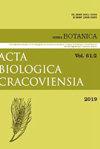丹参酮在普氏鼠尾草离体培养中的应用
IF 0.5
4区 生物学
Q4 PLANT SCIENCES
引用次数: 4
摘要
测定了四种丹参酮在不同离体丹参酮培养物中的含量。丹参酮的积累与组织的类型和年龄有关,并受生长条件的影响。分化组织(离体培养芽、离体再生苗的芽和根)比未分化组织(即4个愈伤组织)含有更多的二萜类化合物。根是丹参酮积累最重要的器官。4周龄植株的根中含量最高(5.1 ~ 5.6 mg g -1 DW);用于诱导根的芽在增殖培养基上保持2.5-4年,每4周进行常规继代培养。本文章由计算机程序翻译,如有差异,请以英文原文为准。
Tanshinones in Culture of Salvia Przewalskii Maxim in Vitro
The content of four tanshinones was determined in different in vitro cultures of Salvia przewalskii . Accumulation of tanshinones depended on the type and age of tissue and could be altered by growth conditions. Differentiated tissues (in vitro cultured shoots, shoots and roots of plantlets regenerated in vitro) contained more diterpenoids than undifferentiated tissues (i.e., the four callus lines). Root was the most important organ for tanshinone accumulation. The highest levels were achieved in roots of 4-week-old plantlets (5.1–5.6 mg g -1 DW); the shoots used for root induction were maintained on multiplication medium for 2.5–4 years with regular subcultures every 4 weeks. .
求助全文
通过发布文献求助,成功后即可免费获取论文全文。
去求助
来源期刊
CiteScore
3.00
自引率
0.00%
发文量
0
审稿时长
>12 weeks
期刊介绍:
ACTA BIOLOGICA CRACOVIENSIA Series Botanica is an English-language journal founded in 1958, devoted to plant anatomy and morphology, cytology, genetics, embryology, tissue culture, physiology, biochemistry, biosystematics, molecular phylogenetics and phylogeography, as well as phytochemistry. It is published twice a year.

 求助内容:
求助内容: 应助结果提醒方式:
应助结果提醒方式:


